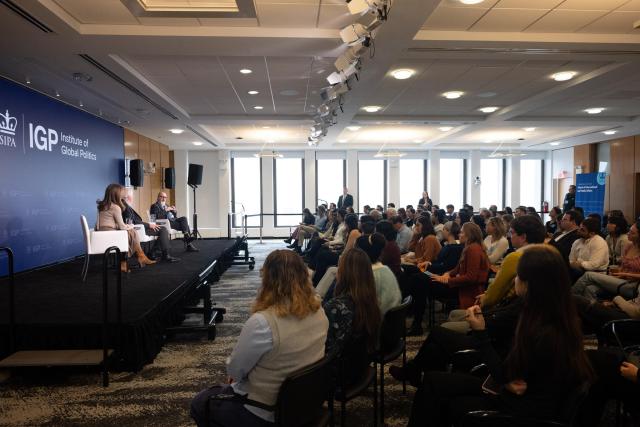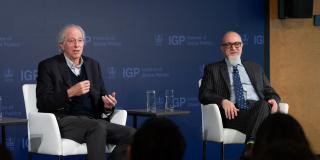
Two Diplomats Discuss: What’s Next for the Middle East?

As the war between Israel and Hamas enters its fourth month of fighting, SIPA’s Institute of Global Politics (IGP) brought together a pair of practitioners with years of diplomacy and peacebuilding experience on January 26 to grapple with the question: What’s next for the Middle East?
“One of the biggest mistakes that we have made is that we've looked at the peace process [in the Middle East] simply as a diplomatic process,” said Ghaith al-Omiri, the former executive director of the American Task Force on Palestine. “Yet, what we neglected is that it has to be rooted in reality on the ground, both the political reality on the ground and the physical reality on the ground.”
“The peace process was nonexistent on October 6, and it was nonexistent for a number of reasons.”
- Ghaith al-Omiri
Joining Al-Omari onstage was Dennis Ross, who has held numerous senior diplomatic positions, serving as the US State Department’s Director of Policy Planning, Special Middle East Coordinator, and Special Adviser for the Persian Gulf and Southwest Asia, among other positions.
The two panelists have worked together for several years, contributing to previous rounds of the peace process from different perspectives. They kicked off the conversation by discussing how the lack of active peace processes led to the events of October 7.
“The peace process was nonexistent on October 6, and it was nonexistent for a number of reasons,” said al-Omari, who is also a senior fellow in the Washington Institute's Irwin Levy Family Program on the US-Israel Strategic Relationship. “So you had a complete vacuum [in Palestine], both related to the fear of failure of diplomacy, but also poor governance, corruption… with this kind of political reality, it's hard to talk about diplomacy.”

Looking at the Israeli side of the peace process, Ross said he felt that negotiations over the years should have focused “much more on people to people as a way of humanizing each side to the other side.” If this had been a regular part of the process, he suggested, there could have been a clearer path to success.
The event was the first installment of the School’s new Dialogue Across Difference series, part of a University-wide initiative. As Interim Provost Dennis Mitchell wrote in a letter to the community, Dialogue Across Difference aims to provide students, faculty, and staff opportunities to confront and engage with contentious ideas and diverse perspectives.
Throughout the discussion, the panelists grappled with this central question of what is next for the region, touching upon the challenges in the peace process, the influence of regional players, and the need for internal reforms in Palestinian politics. Laura Secor, the international editor for The Atlantic, served as moderator, with Secretary Hillary Rodham Clinton, who is chair of IGP’s faculty advisory board, providing opening remarks. Secretary Clinton called the event a “vital forum to come together, hold difficult yet meaningful conversations, and model civil discourse for our students and ourselves on today's most pressing policy challenges.”
Watch the full event below: